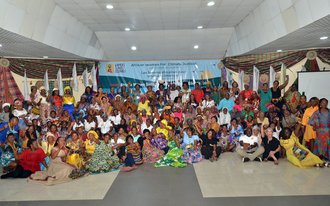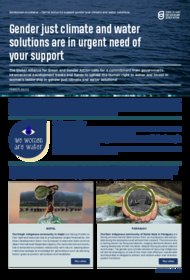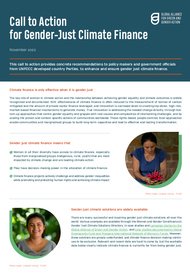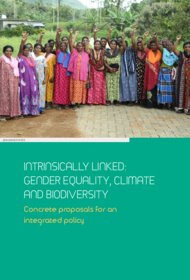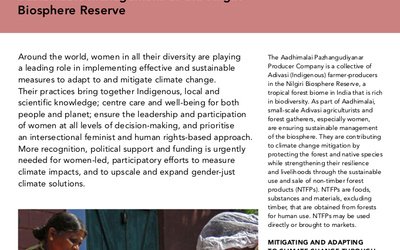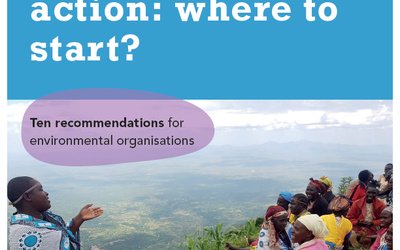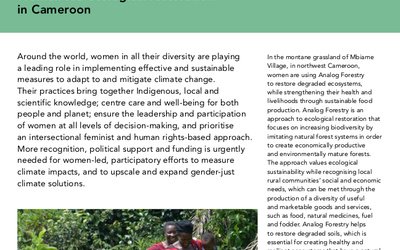African women raise their voice ahead of COP27 and call for climate justice
In October 2022, 150 women from 14 African Countries gathered in Port Harcourt, Nigeria for the first African Women's Climate Assembly. The aim of this Assembly was to strengthen and unify women-led struggles against dirty extractives and false solutions to the climate crisis in West and Central Africa, and propose the real development solutions that support women's interests in a good and decent life and livelihoods in a time of climate crisis.
The Assembly, organised by Both ENDS's partners WoMin, Kebetkache, LSD, and Green Development Advocates Cameroon (GDA) was a feminist, women's rights forum for organising, solidarity and learning which will deepen women's leadership, knowledge, and movement across struggles in West and Central Africa. Participating were women resisting extractives projects including dirty energy, industrial agriculture, industrial fishing, industrial forestry, and mega infrastructure; women impacted by climate change and related impacts, like war, rising sea levels and loss of harvests; and women from NGOs and solidarity organisations.
Floods in Nigeria
Emem Okon, Executive Director of Kebetkache: "Women bear the brunt of climate crisis, suffering lack of access to clean drinking water and land, food insecurity, destruction of properties and farmland, deforestation and flooding. During the Assembly, Nigeria was suffering severe floods. Some people have been living in canoes or in the middle of the road for one month now. Schools are shut down in affected areas. So delegates of the Assembly visited the flood impacted communities and took food supplies, sanitary pads, Dettol, water, toiletries, and provisions."
Activities at the Assembly included songs, dance and drama, workshops, breakaway and plenary sessions. Women deepened their knowledge on the climate crisis, climate change, and false solutions, learned how to use theatre as a tool for resistance, and they shared experiences and strategies. All this with the goal to improve women's leadership and the effectiveness of their actions, and to bring women's voices to governments, NGO's and the wider public.
Emem Okon: "The Assembly provided the opportunity to share stories, lament, cry, and comfort each other, articulate demands and call for action. It provided an opportunity to mobilize women to lead the grassroots climate justice movement in Africa. The voices of the African women and their demands will be amplified at the COP27 in Egypt."
Call for climate justice
To do so, the participants drafted a joint statement which will be used at the UN's climate conference (COP27) in Egypt to spread the African women's call for climate justice, including demands for debt cancellation, for the climate debt to be settled by historically responsible countries and polluters, and for supporting living alternatives for Africa's citizens.
The Women's Assembly was organised as part of the African People's Counter COP (APCC) of the African Climate Justice Collective (ACJC), and marked the start of a permanent assembly of African women for climate justice and just African women-centred development alternatives.
Read more about this subject
-
Dossier
Global Alliance for Green and Gender Action (GAGGA)
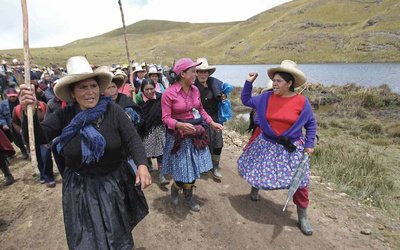
GAGGA rallies the collective power of the women's rights and environmental justice movements to realize a world where women can and do access their rights to water, food security, and a clean, healthy and safe environment.
-
News / 8 March 2021
GAGGA launches “We, Women are Water” campaign 2021
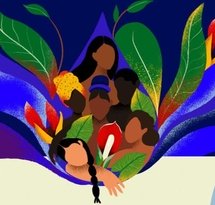
On International Women's Day (March 8th) the Global Alliance for Green and Gender Action (GAGGA) will launch the "We, Women are Water" campaign to highlight women's role, demands and actions in ensuring water security in the face of climate change.
-
Publication / 15 March 2023
-
External link / 19 June 2020
Nepalese women lead local advocacy on climate change (Annual Report 2019)
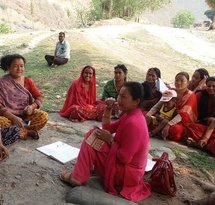
In 2019, Karambot Women's Agriculture Group (Nepal) convinced their municipality to fund its proposed irrigation plan, after they followed a planning and budgeting training.
-
Publication / 4 November 2022
-
Event / 7 March 2018, 15:00 - 16:30
Women's Rights & Climate Finance Webinar: getting the money to the people
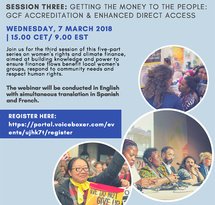
Join us for the third session of this five-part series on women's rights and climate finance, aimed at building knowledge and power to ensure finance flows benefit local women's groups, respond to community needs and respect human rights.
-
Blog / 22 March 2018
Small local organisations in Mongolia bring hope in difficult times
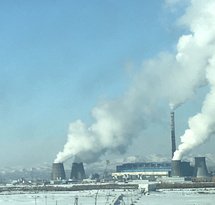
"How many layers of clothing are you wearing? One? No, that's not enough. You should wear your ski pants over your jeans, and change your shoes for snowboots." And there you are, on day 1 of your trip to Mongolia. I had already heard that Mongolia is very cold at the end of November, and with -22 degrees that seemed to be all true.
-
Event / 5 March 2023, 13:00
Feminist March

On Sunday March 5 Both ENDS will be joining the Feminist March (called Women's March before). It starts at 1 PM at De Dam in Amsterdam.
With our block "Feminists for Climate Justice" we'll gather in front of Madame Tussauds.
-
Publication / 2 November 2021
-
Publication / 4 November 2022
-
News / 3 June 2020
Green light for FGG and GAGGA!
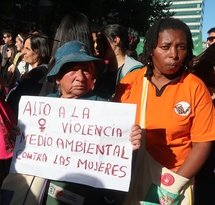
Last Friday, 29 May, it was announced that both the Fair, Green and Global Alliance (FGG) and the Global Alliance for Green and Gender Action (GAGGA) have been selected as two of the 20 potential strategic partnerships of the Dutch Ministry of Foreign Affairs for the 2021-2025 period. Both ENDS is pleased that the Dutch government is seriously considering extending its support to these networks, as they show that cooperation on the basis of equality between grassroots organisations and NGOs throughout the world can continue to bring about change in the position of women, in respect for human rights and in making trade chains and financing systems sustainable.
-
Video / 28 August 2018
Webinar series: women’s rights and climate finance, #5

The fifth session of our five part series on women's rights and climate finance, Experiences and Perspectives of Women Engaging in Climate Finance, shared the insights of three activists who have been serving as GCF Monitors as part of the "Women Demand 'Gender-Just' Climate Finance" initiative. They spoke about their processes of learning about climate finance and connecting with others to monitor climate finance in their communities and regions, discussed the value they have found in this work, and answered questions from webinar participants.
-
Video / 1 February 2018
Webinar series: women’s rights and climate finance, #2

The second session of our five part series on women's rights and climate finance, Gender Mainstreaming in Climate Finance Mechanisms, provided an overview of how gender equality has been mainstreamed into global climate finance mechanisms, including a deep dive on gender considerations under the Green Climate Fund by Liane Schalatek of the Heinrich Boell Foundation - North America.
-
Publication / 26 November 2020
-
Publication / 4 November 2022
-
Transformative Practice
Non-Timber Forest Products (NTFPs)
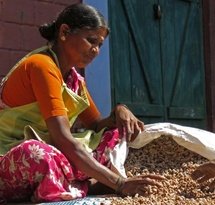
About one in every six people, particularly women, directly rely on forests for their lives and livelihoods, especially for food. This shows how important non-timber forest products (NTFPs) and forests are to ensure community resilience. Not only as a source of food, water and income, but also because of their cultural and spiritual meaning.
-
News / 31 March 2022
Well-deserved recognition for small grants funds!
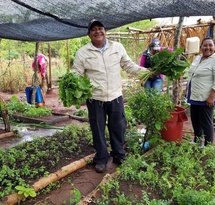
We are exited about the news that Ms MacKenzie Scott decided to entrust substantial funding to a wide range of small grants funds from Both ENDS' partner networks*. These small grants funds are unique as they are set up and led by people, often activists themselves, from the country or region in which the fund is based. Most mainstream conventional funders admit they have difficulties reaching community based organisations and grassroots groups themselves. Small grants funds know better than anyone how to reach local communities, who to support and what kind of financial as well as non-financial support is most needed. Thus, they bridge a wide funding gap. Both ENDS applauds this recognition of the important role of these funds in the funding landscape. We hope this encourages more funders to join!
-
News / 8 March 2018
Only 0.2 % of all foundation funding for women & environment
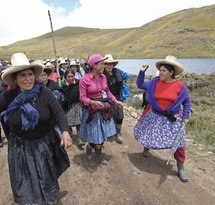
Women around the globe are at the forefront of addressing the impacts of climate change and environmental degradation, designing, implementing, and scaling up their own solutions. Socially defined gender roles often position women and girls as stewards of the physical, economic, and cultural well-being of their communities.
-
Event / 14 April 2018, 11:30
Small grants, big impacts: workshop on Africa Day

On the 14th of April, Both ENDS wil host a workshop called 'Small Grants, Big Impacts' on the annual Africa day in Amsterdam. The workshop aims to demonstrate that so called 'small grants funds' effectively deliver (devopment and climate) money where it matters, to people that need it the most. Large development banks, funds, donors and governments could use small grants funds as alternative financing mechanisms to make sure their money benefits people and their environment now and it the far future.
-
Video / 14 June 2018
Webinar series: women’s rights and climate finance, #4

The fourth webinar of a five part series on women's rights and climate finance: Strategies for Organizing to Influence, Monitor, and Track Climate Finance (from Global to Local), focused on strategies to engage with various actors to both facilitate and advocate for the meaningful inclusion of the perspectives and experiences of women's groups, affected communities, and other civil society stakeholders in the design and implementation of projects and programs.



